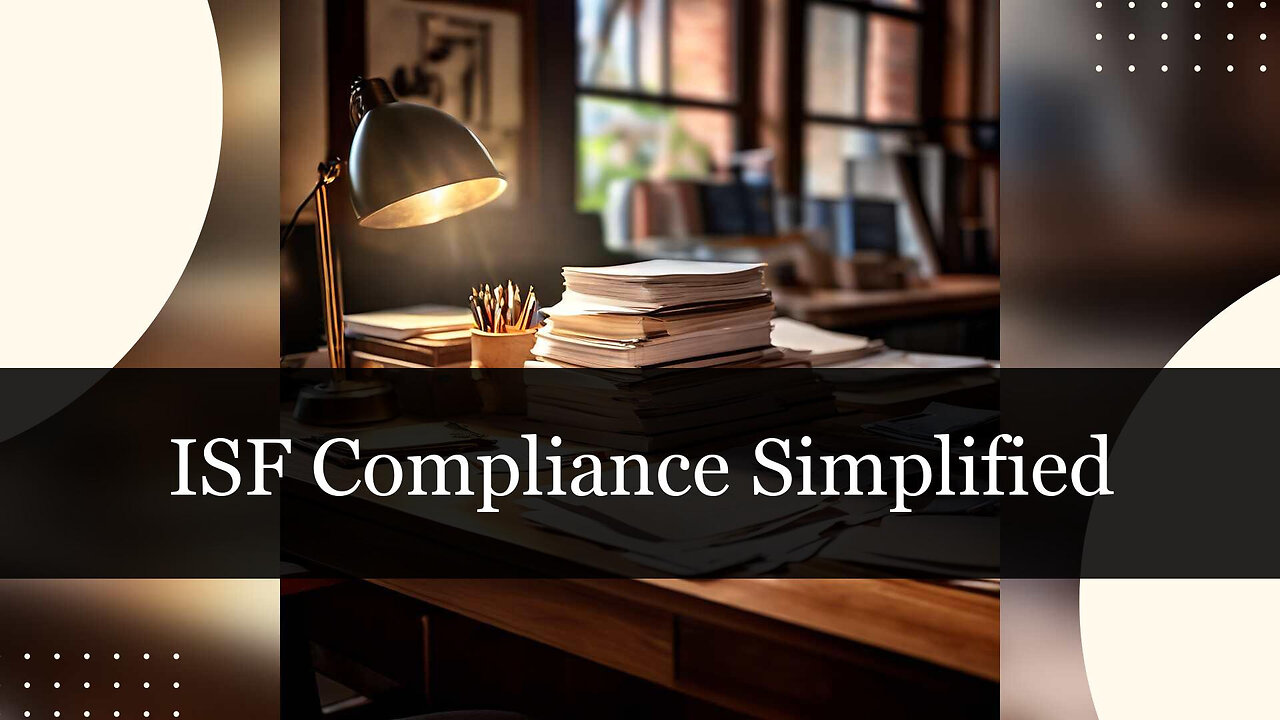Premium Only Content

Navigating the Storm: How Supply Chain Disruptions Affect ISF Compliance
License To Import // 323-578-6432 // file@licensetoimport.com // www.licensetoimport.com
Customs brokerage is a profession that ensures compliance with customs regulations and laws for imported or exported goods. Customs brokers act as intermediaries between importers/exporters and government authorities, streamlining the process and facilitating the movement of goods across borders. Importer Security Filing (ISF) compliance is a critical aspect of customs brokerage, and supply chain disruptions can have a significant impact on achieving this compliance. ISF is a mandatory filing requirement enforced by the US Customs and Border Protection (CBP) for ocean shipments entering the United States. When supply chain disruptions occur, such as port congestion or labor strikes, importers may struggle to meet ISF deadlines and comply with the information requirements. Increased cargo inspections by customs authorities during disruptions can lead to additional costs and delays for importers, further impacting ISF compliance. To navigate these challenges, importers can enlist the services of a knowledgeable customs broker who can help them understand and meet ISF requirements. Customs brokers often leverage technology to streamline the customs clearance process, using advanced systems and software to manage shipments and communicate with authorities. Importers should also proactively assess risks, develop contingency plans, and maintain strong partnerships with customs brokers and logistics providers to navigate supply chain disruptions effectively.
#usimportbond
#isfcustomsbroker
#uscustomsclearing
#isfentry
Video Disclaimer Here: This video is solely for education and is not endorsed by any US government agency.
-
 1:00:33
1:00:33
inspirePlay
15 hours ago $2.86 earned🏌️♂️ 3 Joes vs 1 Pro Golfer – You Won’t Believe This Ending! 🤯🔥
23.3K1 -
 20:47
20:47
MTNTOUGH Fitness Lab
21 hours agoDELAYED: Kyrgyzstan Ibex Hunt | A MTNTOUGH Original
25.2K -
 59:50
59:50
Trumpet Daily
21 hours ago $6.04 earnedThe End of the Trans-Atlantic Alliance - Trumpet Daily LIVE | Feb. 17, 2025
21.8K20 -
 52:05
52:05
PMG
12 hours ago $1.54 earnedWhat Does Freedom Cost? Steven Solomon's On-the-Ground Documentary in Ukraine
21.3K -
 2:38:54
2:38:54
TimcastIRL
13 hours agoElon Secret Child Scandal ERUPTS, Ashley St. Clair Story Goes Viral w/Bethany Mandel | Timcast IRL
194K128 -
 2:04:52
2:04:52
Kim Iversen
15 hours agoElon's Pumping Out Babies Like They're Tesla Model 3's | EU Panics Over Peace Talks, Wants More War
183K204 -
 1:05:35
1:05:35
Man in America
18 hours agoFort Knox & Trump’s Secret Gold Move—The Financial Reset NO ONE Is Ready For?
129K176 -
 2:21:20
2:21:20
Robert Gouveia
15 hours agoTrump Goes to SCOTUS! Judge CAVES on DOGE? Fani Willis Not Happy!
134K36 -
 20:41
20:41
Stephen Gardner
15 hours ago🔥You Won't BELIEVE What JUST Happened To Don Trump Jr.!!
145K237 -
 58:00
58:00
The StoneZONE with Roger Stone
13 hours agoEuropean Leaders Resist Trump Peace Overtures To Their Own Demise | The StoneZONE w/ Roger Stone
103K12